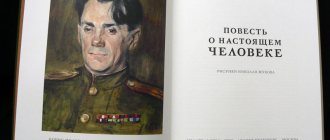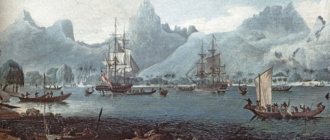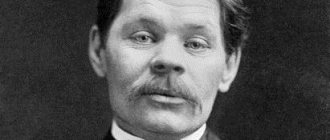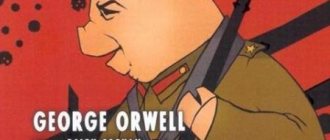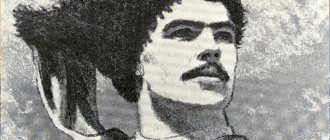Alexey Maresyev. The story of a real person
Exactly 100 years ago, on May 20, 1916, the famous Soviet pilot Alexei Petrovich Maresyev was born in the city of Kamyshin, whose feat formed the basis of the book “The Tale of a Real Man,” which was included in the course of Soviet school literature. There was probably not a single person in the Soviet Union who had not heard of this fighter pilot. The feat he accomplished during the Great Patriotic War still lives in the memory of people today. Thanks to Boris Polevoy’s book, Maresyev entered people’s consciousness as the standard of a “real person.” Under this high title, he will forever be inscribed in the history of our country.
Alexey Maresyev will remain in the public consciousness thanks to his superhuman endurance and will to live. The feat he accomplished was worthy of both a separate book and a film made from it later. After returning to his 18-day crawl through the woods, suffering from frostbite and having both legs amputated, this man did not break down or give up. He not only put on prosthetics, but also returned to aviation: that in itself was akin to a miracle. But Maresyev not only returned to the sky, he returned to the fighter unit, continuing to fight for the freedom and independence of his homeland.
Alexey Petrovich Maresyev was born on May 20, 1916 in the city of Kamyshin, Saratov province. Alexei and his two brothers, Peter and Nikolai, were raised by their mother. The father of the future pilot, who went through the battles of the First World War, died from the consequences of numerous wounds when Alexei was only three years old. During his childhood, Maresyev was not particularly healthy; the boy was often ill and suffered a severe form of malaria, the consequence of which was rheumatism. Alexei was tormented by terrible pain in his joints, and his family’s neighbors whispered among themselves that he would not last long. However, from his father, whom Alexey practically did not know and did not remember, he inherited enormous willpower and stubborn character.
After graduating from the 8th grade of a secondary school in Kamyshin, Alexey Maresyev received a specialty as a metal turner at a local school at a timber mill. Here he began his career. Twice during this time he submitted documents to the flight school, but both times they were returned, citing his health. In 1934, the Kamyshinsky district committee of the Komsomol sent the future hero to build the city of Komsomolsk-on-Amur. It was in the Far East, without interruption from work, that Alexey began to study at the flying club, finally realizing his craving for the sky, which arose in him as a child.
In 1937 he was drafted into the army. Initially, he served in the 12th air border detachment located on Sakhalin Island, but then was transferred to the 30th Chita Military Pilot School, which was transferred to Bataysk in 1938. Maresyev graduated from the Bataysk Aviation School named after A.K. Serov in 1940, receiving the rank of junior lieutenant. After completing his studies at the school, he was retained there as an instructor. It was in Bataysk that Maresyev would meet the beginning of the Great Patriotic War.
After the start of the war, the pilot was sent to the Southwestern Front, where he fought as part of the 296th Fighter Aviation Regiment. He made his first combat mission on August 23, 1941 in the Krivoy Rog area. The first months of the war were a very difficult time for the entire Red Army and Soviet aviation. The Germans were superior to the Soviet pilots in accumulated experience, in the level of proficiency in the equipment they had been flying for quite a long time, as airplanes. Maresyev was saved by the fact that he was already an experienced pilot. And although he did not chalk up any air victories in 1941, he remained alive. Later, the famous Soviet ace Alexander Ivanovich Pokryshkin said that those who did not fight in 1941-1942 do not know the real war.
He shot down his first German aircraft, a Ju-52 transport aircraft, in early 1942. In March 1942, Alexey Maresyev was sent to the North-Western Front, by which time he had already shot down 4 German aircraft. It was here that an air battle took place that would change his life forever.
In the spring of 1942, between lakes Seliger and Ilmen, Soviet troops near the inconspicuous town of Demyansk surrounded an approximately 100,000-strong group of German troops, which did not think of giving up, putting up organized and very strong resistance. On April 4, 1942, in the area of this so-called “Demyansk Pocket”, during a flight to cover bombers in a battle with German fighters, Maresyev’s Yak-1 aircraft was shot down. He tried to make an emergency landing in the forest, noticing a suitable lake there. However, his plane caught the landing gear on the tops of pine trees and overturned. The plane fell into deep snow, and the pilot himself was seriously injured, but survived.
For 18 whole days, the pilot who injured his feet, first on crippled legs, and then crawled, made his way to the front line. Having eaten the onboard rations along the way, he ate what he could find in the forest: tree bark, berries, pine cones. The situation seemed hopeless: finding himself alone in the middle of an endless and dense forest, with injured legs, the pilot simply did not know where he should go, or rather, crawl. How he ended up staying alive is unknown to anyone. Alexey Petrovich never liked to remember this story and tried not to talk about it. According to him, he was driven at that moment by an indomitable desire to live.
In the end, he finally made it out to his own people. Near the village of Plav, Kislovsky village council, Valdai district, he was noticed by a father and son, local residents. Since the pilot by that time was no longer responding to questions, father and son, out of fear, returned back to the village, thinking that there was a German in front of them. Only later was the barely alive pilot discovered by children from the same village - Sasha Vikhrov and Seryozha Malin, who determined that it was a Soviet pilot in front of them, and with the help of Sasha’s father, they took the wounded pilot on a cart to their home. Village residents looked after Maresyev for more than a week, but he needed qualified medical care. In early May, a plane landed near the village, and Maresyev was transported to a hospital in Moscow.
This could be the end of Alexei Petrovich's story. By the time he was delivered to Moscow, the pilot was already in critical condition; he had gangrene. At the same time, there were quite a lot of wounded in the hospital, so the brought fighter pilot, as if he was practically hopeless, was laid on a gurney in the corridor. Here, while making a round, Professor Terebinsky accidentally drew the attention of him, who ultimately saved his life. True, he had to pay for this by amputating both legs in the lower leg area. There was simply no other way out; by that time, Maresyev had begun to develop gangrene, incompatible with life.
The amputation of both legs seemed to put an end to the pilot’s career. However, Maresyev was not going to give up. He did not accept the idea that he would have to part with the sky, having made a decision for himself - to return to aviation and fly again at any cost. Having accepted this, he began to train almost immediately: walking, running, jumping and, of course, dancing. True, he had to learn to dance again not with the nurses in the hospital, who were afraid that he would crush their legs with his insensitive prosthetics, but with his neighbors in the hospital ward, who specially put on work boots for the duration of the training.
In just 6 months of intensive training, Alexey Maresyev learned to walk on prosthetics in such a way that only a rare person could notice something unusual in his gait. He continued to train in the sanatorium, where he was sent in September 1942. Already at the beginning of 1943, the commission wrote down in the personal file of the senior lieutenant: “Fit for all types of aviation.” After passing a medical examination, he was sent to the Ibresinsky flight school (Chuvashia). In February of the same year, the pilot made his first flight after being seriously wounded. He was helped in this by the head of the flight school, Anton Fedoseevich Beletsky, who himself flew with a prosthesis instead of his right leg.
Only because, after an emergency landing and the death of his plane, the pilot spent 18 days getting out of the Valdai forests, his action could safely be called a feat. However, what was much more striking was that after the amputation of both legs, Maresyev not only did not break, but also achieved simply incredible results: overcoming a lot of administrative and medical barriers, he returned to duty.
Maresyev reached the front again in June 1943, joining the 63rd Guards Fighter Aviation Regiment. Initially, Maresyev was not allowed to fly on combat missions in the regiment. The regiment commander simply did not let the pilot go into battle, since the situation in the sky above the field of the future Battle of Kursk was extremely tense. Alexey was very worried about this situation. As a result, the commander of one of the squadrons of the regiment, A. M. Chislov, sympathized with him. He took Maresyev on a couple of combat missions. As a result, several successful flights together with Chislov helped correct the situation, and confidence in the pilot in the regiment increased.
On July 20, 1943, during an air battle with superior German forces, Maresyev saved the lives of two Soviet pilots by shooting down two German Fw.190 fighters, which were covering Ju.87 dive bombers. Thanks to this, the military glory of Alexei Maresyev scattered throughout the 15th Air Army and along the entire front. Correspondents from all over the country frequented the 63rd Fighter Aviation Regiment, among whom was Boris Polevoy, author of the future book “The Tale of a Real Man.”
What is also surprising in this story is that, having returned to the combat unit after the amputation of both legs, Maresyev shot down 7 combat aircraft, bringing his list of aerial victories to 11 enemy aircraft. At the same time he was awarded the title of Hero of the Soviet Union. In 1944, Alexei agreed to an offer to become an inspector-pilot and move from a fighter aviation regiment to the Air Force University Directorate. The pilot himself honestly admitted that the loads during flights only grew, and it became more and more difficult for him to bear them. At the same time, Maresyev never refused combat missions, but did not complain when he was offered a new job. As a result, in June 1944, Guard Major Alexei Maresyev accepted the offer to become an inspector.
In total, during the Great Patriotic War, Maresyev made 86 combat missions, shooting down 11 German aircraft: 4 before being wounded and 7 after. He served in military service until 1946, when he retired for health reasons. At the same time, the former fighter pilot tried to keep himself in very good physical shape. A man who lost his legs in the war was fond of skating, skiing, swimming and cycling. As a result, he even managed to set a record in a sanatorium near Kuibyshev, swimming here across the Volga (2200 meters) in 55 minutes. Maresyev made his last flights on an aircraft (trainer U-2) in the early 1950s, working as an instructor at a special Air Force school in Moscow.
Alexey Petrovich Maresyev became the very person about whom you can talk your whole life - a feat. Moreover, after the war, he still brought great benefit to the country’s Air Force, being involved in the process of training future pilots. In addition, starting in 1956, when the Soviet (and later Russian) Committee of War and Military Service Veterans was formed, retired Colonel Maresyev headed it. He remained at this public (but in his own way also military post) until the last days of his life.
Alexey Petrovich, despite everything, lived quite a long life. Somehow he managed to overcome the consequences of both a difficult childhood and an injury received during the war. On May 18, 2001, a gala evening dedicated to the 85th anniversary of Alexei Maresyev was to be held at the Russian Army Theater. He was just about to arrive at this event when he was struck by a heart attack; he was taken to the intensive care unit of one of the Moscow clinics, but the doctors were unable to save his life. As a result, the gala evening in his honor began with a minute of silence.
It often happens that a person who becomes the prototype of a book character in life does not live up to the image created by the writer. However, Maresyev is a living example of the opposite. With his whole life, he proved that the book “The Tale of a Real Man” is not a colorful myth, but a real story that tells about the great courage and unsurpassed fortitude of this man.
In honor of the centenary of the birth of the Hero of the Soviet Union and the famous pilot Alexei Petrovich Maresyev, a Center for Patriotic Education will be opened in his small homeland in the city of Kamyshin, and a parade will be held with the participation of the Russian Knights and Swifts air groups, TASS reports. The name of Alexey Maresyev will be given to an aircraft of the Russian Ministry of Emergency Situations and one of the new streets of Volgograd. In addition, commemorative events dedicated to the anniversary will be held in Moscow, Tver and Nizhny Novgorod regions, as well as in other regions of Russia. In turn, the Russian Military Historical Society will continue the search for the Yak-1 fighter, on which in 1942 the pilot was shot down during an air battle in the area of the “Demyansk Pocket”.
Based on materials from open sources
Main characters
Alexey Meresyev
In “The Tale of a Real Man,” the hero, a brave Russian pilot, is an example of true patriotism and courage. Meresyev was shot down by the Nazis. For 18 days the pilot crawled through enemy territory, he crawled towards the roar of guns, trying to get to his own. The frostbitten and wounded legs had to be amputated. A pilot without legs is not a person. He began to despair, unable to imagine himself without flying. The commissar’s support and his strong confidence helped the pilot, and Meresyev found the strength to return to the sky. This is a real man of our Motherland, a symbol of courage and heroism.
